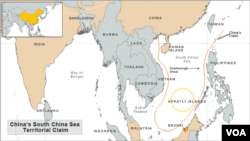MANILA —
The United States will come to the aid of the Philippines in the event of conflict with China over disputed waters in the South China Sea, the commander of the U.S. Navy said on Thursday.
The comments by Admiral Jonathan Greenert, chief of naval operations of the U.S. Navy, were the most explicit statement of U.S. support for the ill-equipped Philippine military which is facing a more assertive China in disputed waters.
"Of course, we would help you,'' Greenert told students of the National Defense College of the Philippines in response to a question about a hypothetical Chinese occupation of one of the disputed Spratly Islands.
"I don't know what that help would be specifically. I mean, we have an obligation because we have a treaty. But, I don't know in what capacity that help is.''
China claims about 90 percent of the South China Sea's 3.5 million sq km (1.35 million sq mile) waters. The sea provides 10 percent of the global fisheries catch and carries $5 trillion in ship-borne trade each year.
Taiwan, Malaysia, the Philippines, Brunei and Vietnam also claim parts of the sea.
The Philippines has taken its dispute with China to arbitration under the U.N. Convention on the Law of the Sea but China is refusing to participate in the case.
China has rejected challenges to its sovereignty claims, and accused the Philippines of illegally occupying Chinese islands in the seas and of provoking tension there.
Greenert said the United States supported the Philippines' case and opposed China's aggressive behavior and would work with allies to maintain freedom of navigation.
The United States has spoken out against China's assertive moves which have in recent months included the imposition of an air defense identification zone in northeast Asia and new fishing rules in South China Sea.
"I think you may have seen some statements coming from our policy-makers exactly in that direction, you will see more of that from us,'' he said, adding he believed China wanted to be clear on where the United States stood.
Greenert said the United States was deploying more ships in the region as it rebalanced foreign policy towards Asia and the United States hoped to deploy 60 ships in the Western Pacific from about 45 to 50 now.
The comments by Admiral Jonathan Greenert, chief of naval operations of the U.S. Navy, were the most explicit statement of U.S. support for the ill-equipped Philippine military which is facing a more assertive China in disputed waters.
"Of course, we would help you,'' Greenert told students of the National Defense College of the Philippines in response to a question about a hypothetical Chinese occupation of one of the disputed Spratly Islands.
"I don't know what that help would be specifically. I mean, we have an obligation because we have a treaty. But, I don't know in what capacity that help is.''
China claims about 90 percent of the South China Sea's 3.5 million sq km (1.35 million sq mile) waters. The sea provides 10 percent of the global fisheries catch and carries $5 trillion in ship-borne trade each year.
Taiwan, Malaysia, the Philippines, Brunei and Vietnam also claim parts of the sea.
The Philippines has taken its dispute with China to arbitration under the U.N. Convention on the Law of the Sea but China is refusing to participate in the case.
China has rejected challenges to its sovereignty claims, and accused the Philippines of illegally occupying Chinese islands in the seas and of provoking tension there.
Greenert said the United States supported the Philippines' case and opposed China's aggressive behavior and would work with allies to maintain freedom of navigation.
The United States has spoken out against China's assertive moves which have in recent months included the imposition of an air defense identification zone in northeast Asia and new fishing rules in South China Sea.
"I think you may have seen some statements coming from our policy-makers exactly in that direction, you will see more of that from us,'' he said, adding he believed China wanted to be clear on where the United States stood.
Greenert said the United States was deploying more ships in the region as it rebalanced foreign policy towards Asia and the United States hoped to deploy 60 ships in the Western Pacific from about 45 to 50 now.







